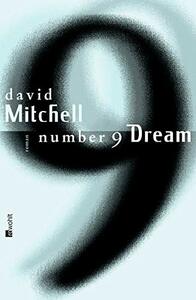Take a photo of a barcode or cover
2.5*
Found myself somewhere in the middle of rating scales. There were parts that I enjoyed and then there were dreams that didn't make any sense or perhaps my pea sized brain was unable to dissect and deduct any conclusion of what I had read. Will write more once I gather my thoughts on this or whatever I will be left with of this book in my memories.
Found myself somewhere in the middle of rating scales. There were parts that I enjoyed and then there were dreams that didn't make any sense or perhaps my pea sized brain was unable to dissect and deduct any conclusion of what I had read. Will write more once I gather my thoughts on this or whatever I will be left with of this book in my memories.
Not my favorite David Mitchell, but oh! how I love David Mitchell.
I'm just starting to get back into fiction, but so far this is one of my favorite books of all time. Which, with Cloud Atlas, makes David Mitchell one of my favorite authors of all time.
It was so intriguing and unexpected and compelling. The stream of consciousness, the endless twists, the blur of reality and dreams, the realistic and ridiculous, the dialogue, SO fun.
400p
It was so intriguing and unexpected and compelling. The stream of consciousness, the endless twists, the blur of reality and dreams, the realistic and ridiculous, the dialogue, SO fun.
400p
Number 9 dream -
the title caught my fancy. Was it the ninth dream, or about the number 9 or some 9th person or incidence- I had no inkling.
the cover art too was fantastic. A purple background.. a painted Japanese bowl from which red smoke emerged which morphed into things. Perhaps it was the dream of a person under influence?
Started as a group read, but only Girish and I could complete it.
Mitchell has become my favourite author, and I was almost sure that I will like this book too. And I wasn't wrong.
Found this interesting, thought provoking, but very very otherworldly with a mingling of fantasy and fact. Sometimes I was not sure whether the fact I was reading was real or imaginary .
many plots were interwoven.
1. Eiji Miyake , a 19 year old in search of his biological father, who is not known to him. He has been abandoned by his mother in childhood, and witnessed the death of his twin sister when they were barely 11 years old.
He comes to Tokyo from his rural village, and is mesmerized by the place and it's people. He gets to know many people , good, not so good and pure evil
2. Goatwriter, Mrs. Comb, his caretaker and Pithecantheopus their "watchdog" and pet . This story was very very weird, nonetheless, enjoyable.
3. The journal written to Takara by his elder brother who volunteered himself at the age of 20 to Japanese submarines during WWII . Here we get a glimpse of wartime Japan
the title : towards he end Number 9 makes more and more impact- via tarot cards and playing cards, lift Number, room Number, floor number... and finally when in a dream (?) John Lennon tells Eiji that No9 song is a continuation of Norwegian wood ... both songs, property of the Beatles.
Butt what is he exact significance of Number 9..still eludes me.
All in all, an alluring read..
the title caught my fancy. Was it the ninth dream, or about the number 9 or some 9th person or incidence- I had no inkling.
the cover art too was fantastic. A purple background.. a painted Japanese bowl from which red smoke emerged which morphed into things. Perhaps it was the dream of a person under influence?
Started as a group read, but only Girish and I could complete it.
Mitchell has become my favourite author, and I was almost sure that I will like this book too. And I wasn't wrong.
Found this interesting, thought provoking, but very very otherworldly with a mingling of fantasy and fact. Sometimes I was not sure whether the fact I was reading was real or imaginary .
many plots were interwoven.
1. Eiji Miyake , a 19 year old in search of his biological father, who is not known to him. He has been abandoned by his mother in childhood, and witnessed the death of his twin sister when they were barely 11 years old.
He comes to Tokyo from his rural village, and is mesmerized by the place and it's people. He gets to know many people , good, not so good and pure evil
2. Goatwriter, Mrs. Comb, his caretaker and Pithecantheopus their "watchdog" and pet . This story was very very weird, nonetheless, enjoyable.
3. The journal written to Takara by his elder brother who volunteered himself at the age of 20 to Japanese submarines during WWII . Here we get a glimpse of wartime Japan
the title : towards he end Number 9 makes more and more impact- via tarot cards and playing cards, lift Number, room Number, floor number... and finally when in a dream (?) John Lennon tells Eiji that No9 song is a continuation of Norwegian wood ... both songs, property of the Beatles.
Butt what is he exact significance of Number 9..still eludes me.
All in all, an alluring read..
4/5
After a significant chunk of the first chapter I thought that maybe I'd finally stumbled upon a "normal" David Mitchell book (I got Black Swan Green gathering dust in my bookshelves somewhere, I know that one is his only normal book), and then all the weird shit starts popping up, and I knew I was in for a good ride, even if by the end of the first chapter, I had no idea what the hell was happening.
Even with all the weird shit, in a lesser manner than what I'd thought, this is indeed simpler than all previous installments of the Mitchellverse that I've read, this is because there's only one main perspective, a departure from his "multiple interconnected novellas" schtick. What makes this one still weird are the seemingly-random interludes about a sentient goat writer that came out of nowhere, Mitchell often puts writers as characters in his books, but the purpose of this one still escape me. Mitchell usually toes the line between pretentious and insightful really well, but after a first read, I'm inclined to think that this whole part is just pretentious, even if it's slightly entertaining. That, plus the slightly-uninteresting main character are the only things I have against this book.
Even with the seemingly simpler structure, Mitchell still found a way to show his versatility on this one. There's one particular part, an epistolary story about a Japanese WWII soldier, which I particularly liked. There's the metafiction of the aforementioned anthropomorphized goat writer, and many more.
Still about the structure, upon reflection, even without the multiple PoVs, this book is structured weirdly. It doesn't seem to follow any archetypical structure and the way it flowed between one section to another is very... dreamlike, which is fitting considering all the dream sequences that blur the line between reality and surreality.
The one thing I've always liked about Mitchell is his unique prose. Maybe I just haven't read enough, but the ways he described the scenes, the way he describes things in general, it's always a joy to read, and when it isn't, it's always unlike anything I've read before. Which is what kept me interested, even if the main character isn't that engaging.
Overall, another great installment in Mitchell's uber novel, I was planning on reading the three books I haven't read before Utopia Avenue comes out, but by now I realize that I can't binge-read his books, so I'll just take a break, and go back into it when I feel like it.
After a significant chunk of the first chapter I thought that maybe I'd finally stumbled upon a "normal" David Mitchell book (I got Black Swan Green gathering dust in my bookshelves somewhere, I know that one is his only normal book), and then all the weird shit starts popping up, and I knew I was in for a good ride, even if by the end of the first chapter, I had no idea what the hell was happening.
Even with all the weird shit, in a lesser manner than what I'd thought, this is indeed simpler than all previous installments of the Mitchellverse that I've read, this is because there's only one main perspective, a departure from his "multiple interconnected novellas" schtick. What makes this one still weird are the seemingly-random interludes about a sentient goat writer that came out of nowhere, Mitchell often puts writers as characters in his books, but the purpose of this one still escape me. Mitchell usually toes the line between pretentious and insightful really well, but after a first read, I'm inclined to think that this whole part is just pretentious, even if it's slightly entertaining. That, plus the slightly-uninteresting main character are the only things I have against this book.
Even with the seemingly simpler structure, Mitchell still found a way to show his versatility on this one. There's one particular part, an epistolary story about a Japanese WWII soldier, which I particularly liked. There's the metafiction of the aforementioned anthropomorphized goat writer, and many more.
Still about the structure, upon reflection, even without the multiple PoVs, this book is structured weirdly. It doesn't seem to follow any archetypical structure and the way it flowed between one section to another is very... dreamlike, which is fitting considering all the dream sequences that blur the line between reality and surreality.
The one thing I've always liked about Mitchell is his unique prose. Maybe I just haven't read enough, but the ways he described the scenes, the way he describes things in general, it's always a joy to read, and when it isn't, it's always unlike anything I've read before. Which is what kept me interested, even if the main character isn't that engaging.
Overall, another great installment in Mitchell's uber novel, I was planning on reading the three books I haven't read before Utopia Avenue comes out, but by now I realize that I can't binge-read his books, so I'll just take a break, and go back into it when I feel like it.
I'm sure it's objectively very well written and literary, I just spend most of the book not really caring about what was happening. Which is a shame. Maybe I'm just never going to be a convert to Mitchell, I always feel like it's complex for the sake of being complex but is fundamentally lacking somewhere. That's not to say there were not elements I liked and it wasn't a wholly unenjoyable experience, just not quite my cup of tea.
adventurous
dark
funny
hopeful
mysterious
reflective
sad
medium-paced
Plot or Character Driven:
A mix
Strong character development:
Yes
Loveable characters:
Yes
Diverse cast of characters:
Yes
Flaws of characters a main focus:
Yes
adventurous
dark
mysterious
tense
medium-paced
Plot or Character Driven:
Character
Strong character development:
Yes
Loveable characters:
Yes
Diverse cast of characters:
Complicated
Flaws of characters a main focus:
Yes
3.5 stars.
I’m grateful to David Mitchell for stretching my brain with number9dream, but I also had the sense that in this, his second book, he was still figuring out how to balance narrative momentum with some of his more self-indulgent impulses. It would only take him one more book to put it all together – in his 2004 masterpiece, Cloud Atlas – but here he’s still learning how to play his instrument, so to speak.
And that’s kind of a bummer, because the stuff that works in number9dream REALLY works. It’s a mystery at heart, set in a near-future Tokyo, as 20-year-old Beatles fanatic Eiji Miyake tries to find the father who abandoned him when he was a child. In his pursuit of the truth, Eiji runs into the yakuza, computer hackers, and black-market organ harvesters, and it all comes to a head with a potentially apocalyptic weather event.
When the plot hums along, it’s as exciting as anything I’ve recently read.
However.
Mitchell can’t seem to help himself and trips things up with some unnecessary narrative shenanigans. I appreciate his desire to experiment, but one chapter features a bizarre children’s story starring a goat who’s an author; another includes a long excerpt from the diary of a WWII-era Japanese soldier; and still another involves some storytelling truck drivers.
Again, I don’t fault Mitchell for his playfulness. But all these alternative narratives only serve to dilute a main storyline that doesn’t need any help. I found myself deeply, genuinely invested in the book when the focus was on Eiji and the strong cast of supporting characters he encounters on the way to learning the truth about his family. Unfortunately, Mitchell would then often choose to bury a brand new story in the middle of a chapter, and I’d find my attention drifting until he returned to Eiji and his adventures.
But – and I want to stress this – I still recommend you read number9dream. The main story is so good that I’m willing to overlook Mitchell’s excesses. And, as I said at the top, I actually appreciate the fact that he pushed me in a direction I’m not used to being pushed.
Just understand that not everything will make sense, no matter how hard you try. Kinda like, you know, a dream.
I’m grateful to David Mitchell for stretching my brain with number9dream, but I also had the sense that in this, his second book, he was still figuring out how to balance narrative momentum with some of his more self-indulgent impulses. It would only take him one more book to put it all together – in his 2004 masterpiece, Cloud Atlas – but here he’s still learning how to play his instrument, so to speak.
And that’s kind of a bummer, because the stuff that works in number9dream REALLY works. It’s a mystery at heart, set in a near-future Tokyo, as 20-year-old Beatles fanatic Eiji Miyake tries to find the father who abandoned him when he was a child. In his pursuit of the truth, Eiji runs into the yakuza, computer hackers, and black-market organ harvesters, and it all comes to a head with a potentially apocalyptic weather event.
When the plot hums along, it’s as exciting as anything I’ve recently read.
However.
Mitchell can’t seem to help himself and trips things up with some unnecessary narrative shenanigans. I appreciate his desire to experiment, but one chapter features a bizarre children’s story starring a goat who’s an author; another includes a long excerpt from the diary of a WWII-era Japanese soldier; and still another involves some storytelling truck drivers.
Again, I don’t fault Mitchell for his playfulness. But all these alternative narratives only serve to dilute a main storyline that doesn’t need any help. I found myself deeply, genuinely invested in the book when the focus was on Eiji and the strong cast of supporting characters he encounters on the way to learning the truth about his family. Unfortunately, Mitchell would then often choose to bury a brand new story in the middle of a chapter, and I’d find my attention drifting until he returned to Eiji and his adventures.
But – and I want to stress this – I still recommend you read number9dream. The main story is so good that I’m willing to overlook Mitchell’s excesses. And, as I said at the top, I actually appreciate the fact that he pushed me in a direction I’m not used to being pushed.
Just understand that not everything will make sense, no matter how hard you try. Kinda like, you know, a dream.
I thought I loved Mitchell’s writing, I think I just loved Cloud Atlas.





